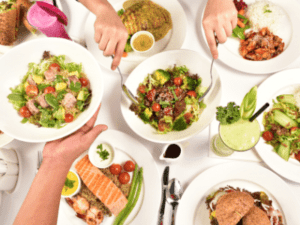शरीर को स्वस्थ व जीवन को लम्बा बनाने तथा बुढ़ापे से बचने के लिए हमें आयुर्वेद के सामान्य स्वस्थ्य टिप्स को अपनाने की आवस्यकता है।
/////////////////////////////////////////////////////////////
-~-~~-~~~-~~-~-
Please watch: “इसाई, मुस्लिम, बौद्ध व हिन्दू गुरु घंटालो का “झूठ बोलो भारत लूटो” षड्यंत्र ! Rahul Arya ”
-~-~~-~~~-~~-~-
https://www.youtube.com/watch?v=SEiAnlLTUzs
It is important to eat a nutritious diet plan after 40 to maintain good health and reduce the risk of disease. The following article highlights some tips for eating nutritiously as well as what foods you should be eating more of. This blog post will help educate readers on how to eat nutritiously and why it's important, so they can make healthier food choices now and in their future!
Eating nutritiously is important for maintaining good health and reducing the risk of disease. However, it can be difficult to know what constitutes a nutritious diet or which foods you should be eating more to get the nutrients your body needs. Fortunately, following some basic guidelines can help ensure that you're on the right track towards a healthy future. Here are some tips:
1)  Include protein at every meal and snack: Protein helps boost metabolism and manage appetite, so try to eat some at breakfast, lunch, and dinner as well as between-meal snacks like yogurt [or cottage cheese], eggs [hard boiled] & peanut butter [on oatmeal] or string cheese [with apple slices]. Lean protein sources include poultry such as chicken, turkey & duck [lean beef], fish rich in omega-3 fatty acids such as salmon, tuna, sardines & trout [shrimp], and plant sources like beans [black or pinto or garbanzo], peas, nuts or tofu.
Include protein at every meal and snack: Protein helps boost metabolism and manage appetite, so try to eat some at breakfast, lunch, and dinner as well as between-meal snacks like yogurt [or cottage cheese], eggs [hard boiled] & peanut butter [on oatmeal] or string cheese [with apple slices]. Lean protein sources include poultry such as chicken, turkey & duck [lean beef], fish rich in omega-3 fatty acids such as salmon, tuna, sardines & trout [shrimp], and plant sources like beans [black or pinto or garbanzo], peas, nuts or tofu.
2) Eat 5 – 9 servings of fresh fruit & vegetables every day: Fresh fruits and veggies are packed with vitamins, minerals, and fiber. While frozen varieties retain some nutrients, dried fruits have lost most of their water-soluble vitamins while the heat used to process canned produce results in nutrient losses; so it's best to stick with freshness whenever possible. Aim for at least 2 ½ cups of veggies daily (which is equivalent to about 5 servings) spread throughout the day and eat 3 fruits daily (equivalent to about 2 servings or 1 fruit).
3)  Drink plenty of water: Dehydration can lead to fatigue, constipation and problems concentrating so aim to drink at least 8 – 10 glasses of water daily. For reference, one glass is equivalent to about 8 ounces. If you're not a fan of plain H2O, try adding some lemon juice for flavor as well as a boost of vitamins & antioxidants.
Drink plenty of water: Dehydration can lead to fatigue, constipation and problems concentrating so aim to drink at least 8 – 10 glasses of water daily. For reference, one glass is equivalent to about 8 ounces. If you're not a fan of plain H2O, try adding some lemon juice for flavor as well as a boost of vitamins & antioxidants.
4) Limit sugar-sweetened beverages: Sugar from these drinks gets added to your diet and excess calories from added sugars typically get stored as fat which makes it more challenging for your body to maintain a healthy weight. Having too much belly fat increases your risk of heart disease, type 2 diabetes, and certain types of cancer. With that in mind, try to limit the amount of sugar-sweetened beverages you consume each day as well as other sweet treats like candy & baked goods.
5) Monitor food labels for serving sizes: It can be challenging to know exactly how much of a particular food to eat so many people rely on nutrition facts labels found on the packaging. However, it's important to pay attention to what constitutes one serving size because the listed amount typically doesn't look much different than if you were to eat 2 or 3 times that amount. For example, 150 calories may sound like a small amount but it represents about 1/3 cup; which is more than most people would eat as a snack in one sitting.
6) Practice portion control: Keep your portions in check by using a kitchen scale and measuring cups to weigh & divide foods evenly into meals, snacks & treats. For instance, if you're cooking up 1/2 cup of rice, measure it into 2 containers rather than eating the entire batch. You can also use your hand as a guide for estimating appropriate portion sizes.
7) Reduce sodium intake: Sodium is an essential nutrient that we need in small amounts; however, most Americans get more than they need from salt found in processed foods such as chips, soups & frozen dinners. As a result, aim for less than 2,300 milligrams of sodium each day which equates to about 1 teaspoon of salt. What's worse is that these kinds of foods are often high in calories so it's best to limit them even further.
8) Limit red meats: Red meat has been linked to increased risk for heart disease, diabetes & certain types of cancer so try incorporating more fish, poultry, or beans into your diet instead. If you do choose to eat red meat, aim for lean cuts such as round steak or top sirloin and cook using methods other than frying.
9) When dining out, share an entrée with a friend or take half home for later: Most restaurant portions are much larger than the recommended serving size so sharing can help keep your diet on track. Eating smaller portions of restaurant meals also tends to be more flavorful since there's less food so it will curb your cravings before they lead you astray.
10)  Eat breakfast daily: People who eat breakfast are usually healthier than those who skip their morning meal – most likely because they have better dietary habits overall. Plus, the body burns calories faster throughout the day when you start with a healthy breakfast that includes whole grains, fiber & fruit, or vegetables. And if you're running late in the morning, try pre-packaging some of your favorite foods so you can grab them on your way out the door.
Eat breakfast daily: People who eat breakfast are usually healthier than those who skip their morning meal – most likely because they have better dietary habits overall. Plus, the body burns calories faster throughout the day when you start with a healthy breakfast that includes whole grains, fiber & fruit, or vegetables. And if you're running late in the morning, try pre-packaging some of your favorite foods so you can grab them on your way out the door.
11) Snack on high-fiber fruits & vegetables: Some options include apples, berries, bell peppers, carrots, cucumber, mushrooms, spinach, or tomatoes.
12) Limit fast food: Although fast food is convenient and may be cheaper than ordering a healthier meal at a restaurant, it tends to lack essential nutrients and dietary fiber so your body doesn't feel as satisfied. Plus, many of these restaurants use large portions and fatty preparations such as deep frying which contributes to weight gain and poor health.
13) Do not skip meals: Skipping breakfast or lunch is never a good idea; your body needs fuel throughout the day to function optimally. By skipping meals, your body goes into starvation mode which slows down metabolism and leads to weight gain. It's also likely that you'll overeat for dinner since you're overly hungry by then.
14) Eat slowly & stop when satisfied, not full: Most people eat way too fast without properly tasting their food which can lead to overeating since it takes about 20 minutes for the brain to receive signals that you're full. If you listen closely, you'll hear your stomach tell your brain when it's had enough so slow down and enjoy your meal.
15) Watch portion sizes: Portion sizes have increased over the last few decades so try using smaller plates or bowls for meals which will help reduce calorie intake without feeling deprived. When purchasing groceries, use smaller cups & serving spoons at home as well.
16) Keep a food diary: Writing down everything that you eat each day will help keep you accountable especially if there are healthier recipes that look good online or in magazines that you'd like to try out. In addition, you can use the diary to track your calories and fat intake.
17) Limit alcohol: Although alcohol isn't necessarily bad for you, many drinks contain lots of sugar & calories which add up over time which is why most experts recommend limiting consumption to one drink per day for women and two for men (and no more than one of those should be a spirit like a vodka since they're high in calories).
18) Switch white bread or pasta with whole-grain varieties: Most pre-packaged foods such as snacks & pastries usually contain refined white flour that's been stripped of its nutrients so switch to whole grain products instead. Or, simply replace white rice with brown rice at home if possible.
The key is to make sure you’re giving your body what it needs. This could be a diet that includes more fruit, vegetables, and whole grains or supplementing with vitamins and minerals if needed. Take the time to get tested for any nutrient deficiencies so you can start strengthening your immune system from within by taking supplements such as vitamin D3 capsules. We hope this article has helped you in your quest for a healthier life! If we can help with anything else or answer any questions about our suggestions please contact us anytime.



बच्चों के लिए डाइट प्लान बताइए अलग अलग उम्र के लिए
This was great, been searching for “how to lose fat after 40” for a while now, and I think this has helped. Have you heard people talk about – Fanlevi Immaculate Eradicator – (just google it ) ? Ive heard some awesome things about it and my cousin got excellent results with it.
Many thanks, I have been researching “thin after 40” for a while now, and I think this has helped. Have you heard people talk about – Fanlevi Immaculate Eradicator – (do a search on google ) ? Ive heard some extraordinary things about it and my mate got cool success with it.
This was great, I have been researching “best weight loss program for women over 40” for a while now, and I think this has helped. Ever heard of – Fanlevi Immaculate Eradicator – (do a google search ) ? Ive heard some amazing things about it and my cousin got excellent results with it.
In winter what should be taken in breakfast in place of Fruits.
Just wonderful, I been tryin to find out about “over 40 workout program” for a while now, and I think this has helped. Have you heard people talk about – Fanlevi Immaculate Eradicator – (just google it ) ? Ive heard some unbelievable things about it and my mate got cool results with it.
This was great, thanks, I’ve been looking for “weight loss over 40 success stories” for a while now, and I think this has helped. Have you ever come across – Fanlevi Immaculate Eradicator – (should be on google have a look ) ? Ive heard some great things about it and my mate got cool success with it.
This was great, been searching for “why is it so hard to lose weight after 40” for a while now, and I think this has helped. You ever tried – Fanlevi Immaculate Eradicator – ( search on google ) ? Ive heard some extraordinary things about it and my friend got great success with it.
Marko Brad
This is glorious, been searching for “best way to lose weight 40 year old woman” for a while now, and I think this has helped. Have you heard people talk about – Fanlevi Immaculate Eradicator – ( search on google ) ? Ive heard some awesome things about it and my brother in law got excellent results with it.
O M G why r u speaking too much hindi some people cant understand soo plz speak simple language plzzz
Many thanks, been searching for “how to speed up my metabolism after 40” for a while now, and I think this has helped. Ever heard of – Fanlevi Immaculate Eradicator – (do a google search ) ? Ive heard some awesome things about it and my buddy got cool results with it.
Winner of a video, I have been researching “weight loss at 40” for a while now, and I think this has helped. Have you ever come across – Fanlevi Immaculate Eradicator – (do a search on google ) ? Ive heard some pretty good things about it and my colleague got excellent results with it.
Please proceed for 60 + age
Gud
I only believe in NextLevelDiet. They provide you with personalized meal plan, training plan, fitness tips, healthy recipes. Thats everything you need to transform your body and get six pack 😀
Dinner. Lunch ke bare me bataien
Nice
Plz provide diet chart for morning, afternoon lunch, evening snacks, n dinner.
Especially women who have health issues.
Thank you.